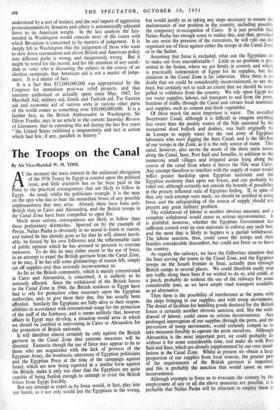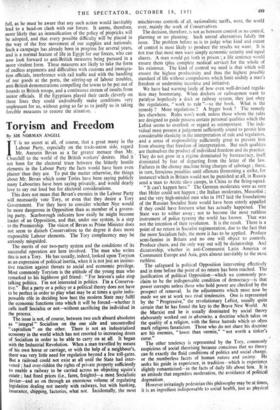The Troops on the Canal
By Air Vice-Marshal W. M. YOOL AT the moment the main interest in the unilateral abrogation of the 1936 Treaty by Egypt is centred upon the political issue, and little attention has so far been paid in the Press to the practical consequences that are likely to follow in Egypt. As usual, whilst the politicians wrangle, it is the man on the spot who has to bear the immediate brunt of any possible unpleasantness that may arise. Already there have been anti- British riots in Cairo and Alexandria, and-the British troops in the Canal Zone have been compelled to open fire.
Much more serious consequences are likely to follow than these preliminary skirmishes. Spurred on by the example of Persia, Nahas Pasha is obviously in no mood to listen to reason, and indeed he has already gone so far that be will, almost inevit- ably, be forced by his own followers and the inflammable state of public opinion which he has aroused to proceed to extreme measures. To do this he may either resort to the use of force, in an attempt to expel the British garrison from the Canal Zone, or he may, if he has still some glimmerings of reason left, simply cut off supplies and thus seriously inconvenience us. As far as the British community, which is mainly concentrated in Cairo and Alexandria, is concerned, it is unlikely to be seriously affected. Since the withdrawal of the British forces to the Canal Zone in 1946, the British residents in Egypt have had to rely for protection when necessary upon the Egyptian authorities, and, to give them their due, this has usually been afforded. Similarly the Egyptians are fully alive to their respon- sibilities in accordance with international usage for the protection of the staff of the Embassy, and it seems unlikely that, however affairs in Egypt may develop, a situation would arise in which we should be justified in intervening in Cairo or Alexandria for the protection of British nationals. It will therefore almost certainly be only against the British garrison in the Canal Zone that extreme measures will be directed. Fantastic though the use of force may appear to be to those who are acquainted with the lack of prowess of the Egyptian Army, the bombastic utterances of Egyptian politicians and the Egyptian Press at the time of the campaign against Israel, which are now being repeated in a similar form against the British, make it only too clear that the Egyptians are quite capable of being foolish enough to attempt to evict the British forces from Egypt forcibly. But any attempt to expel us by force would, in fact, play into our hands. as it not only would put the Egyptians in the wrong, but would justify us in taking any steps necessary to ensure the maintenance of our position in the country, including possibly the temporary re-occupation of Cairo. It is just possible that Nahas Pasha has enough sense to realise this, and that, provided he can resist the pressure of the extremists, he will rule out the organised use of force against either the troops in the Canal Zone or in the Sudan.
Assuming that force is excluded, what can the Egyptians do to make our lives uncomfortable ? Little or no problem is pre- sented- in the Sudan, where we are firmly in control, and which is practically independent of Egypt for its supplies, but the situation in the Canal Zone is far otherwise. Here there is no doubt that we could be considerably inconvenienced, to say the least, but certainly not to such an extent that we should be com- pelled to withdraw from the country. We rely upon Egypt for our water supplies, labour, rail transport to and from the ports, freedom of traffic through the Canal and certain local materials and supplies, such as cement and fresh vegetables. Of these much the most important is water. The so-called Sweetwater Canal, although it is difficult to imagine anything less sweet than the muddy waters of the Nile seasoned by the occasional dead bullock and donkey, was built originally by de Lesseps to supply water for the vast army of Egyptian labourers who were digging the Suez Canal, and is the life-line of our troops in the Zone, as it is the only source of water. This canal, however, also serves the needs of the three main towns along the Canal, Suez, Port Said and Ismailia, in addition to the numerous small villages and irrigated areas lying along the course of the canal from where it leaves the Nile near Cairo. Any attempt therefore to interfere with-the supply of water would inflict greater hardship upon Egyptian nationals and the Egyptian economy than upon our forces, and -can probably be ruled out, although certainly not outside the bounds of possibility in the present inflamed state of Egyptian feeling. If, in spite of that, any such attempt were made, we should be justified in using force, and the safeguarding of the source of supply should not present any great military problem.
The withdrawal of labour is another obvious measure, and a complete withdrawal would cause us serious inconvenience. It is doubtful, however, whether the Egyptian Government- has sufficient control over its own nationals to enforce any such ban, and the most that is likely to happen is a partial withdrawal. The labour sanction, then, could cause the troops and their families considerable discomfort, but could not force us to leave the country.
As regards the railways, we have the Gilbertian situation that the lines serving the towns in the Canal Zone, and the Egyptian troops on the Israeli frontier in Sinai, actually pass -through British camps in several places. We could therefore easily stop any traffic along these lines if we wished to do so, and could, at a pinch, probably do without the use of the railways for some considerable time, as we have ample road transport available as an alternative. , Then there is the possibility of interference at the ports with the ships bringing in our supplies, and with troop movements. The denial of facilities for handling goods destined for the British forces is certainly another obvious sanction, and, like the with- drawal of labour, could cause us serious inconvenience. Any prolonged interruption of. our supplies through the ports, and the prevention of troop movements, would certainly compel us to take measures forcibly to operate the ports ourselves. Although Alexandria is the most important port, we could probably do without it for some considerable time, and make do with Port Said and Suez, which are already supplemented by our own instal- lations in the Canal Zone. Whilst at present we obtain a large proportion of our supplies from local sources, the greater part of the requirements of the British garrison is imported, and this is probably the sanction that would cause us most inconvenience.
Although attempts to force us to evacuate the country by the employment of any or all the above measures are possible, it is probable that Nahas Pasha will be reluctant to employ them in full, as he must be aware that any such action would inevitably lead to a head-on clash with our forces. It seems, therefore, more likely that an intensification of the policy of pinpricks will be adopted, and that every possible difficulty will be placed in the way of the free movement of our supplies and nationals. Such a campaign has already been in progress for several years, and is a normal feature of life in Egypt for our forces, who can now look forward to anti-British measures being pursued in a more virulent form. These measures are likely-to take the form of endless arguments and difficulties with customs and immigra- tion officials, interference with rail traffic and With the handling of our goods at the ports, the stirring-up of labour troubles, anti-British demonstrations compelling the towns to be put out of bounds to British troops, and a continuous stream of insults from minor officials. If the Egyptians played their cards cleverly on these lines they could undoubtedly make conditions very unpleasant for us, without going so far as to justify us in taking forcible measures to restore the situation. .



































 Previous page
Previous page